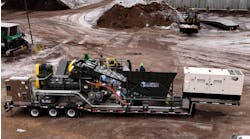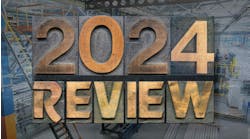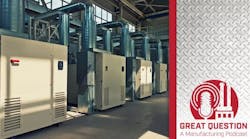Podcast: Tips for Choosing a Compressed Air Service Provider
Whether you're a small business or a large industrial operation, choosing a compressed air service provider can significantly impact your efficiency, productivity, and bottom line. This sponsored podcast chat features Tony Montalto, Director of Technical Product Management at FS-Curtis, as he reveals practical tips and strategies to help you navigate the selection process with confidence and make an informed decision that aligns with your goals and requirements.
Below is an excerpt from the podcast:
PS: So I mentioned you've got 35 years of experience here. What are some of the more memorable projects or experiences from those years on the compressed air side?
TM: Lots! That's what's fun about the air compressor business. If you really do like to learn and see different things, it's endless. I started out up in New York at a pretty big compressor shop and did a lot of learning on the engineering side, and I've just seen so many things, so many industrial plants, how things are made. Power plants, pharmaceutical plants, all that stuff. It's been fun and the business has changed, so I'm kind of excited to chat with you about it.
PS: Excellent. We’ve blocked out three general areas to talk about today for our listeners here. We're going to talk about (1) service capabilities, (2) areas beyond the compressor room, and (3) overall considerations for the size of the companies.
So we'll start with the first one, Tony. This is probably the most critical one. Could you elaborate a little bit about some key criteria to consider when a plant team is evaluating the compressed air service provider's service capabilities? You know, the people who are going to be in their plant helping out with the work.
TM: Right, right. This is a great topic. I go on a lot of webinars and read a lot of articles, I try to stay up to speed with the air compressor business, and it just seems like every single article, every webinar, every podcast we're doing is all about energy savings—energy savings, energy savings, energy savings. Like, purchase our variable speed air compressor, and you will save energy, things like that.
But if you really have an honest discussion with a manufacturing plant and really get to what's most important to them, it's reliability all the way. The widget that they make has to go out the door, the production can't go down. So yes, energy savings is important and there's some titles in the manufacturing plan, it could be energy engineer, and yeah, energy savings is important to that guy. But even that title, if you really got to what's most important to the plant? Honestly, it’s production. It's reliability. It's a great topic. Some of these things that we'll get into today may be important to the end users, some may not be, it's just the preference, just some of the stuff I've seen in my whole life.
So on the service side, I think it's fair for the end user to really look at is the number of service techs (in these provider organizations). Some may have a few, you don't need a fleet of 30 of them necessarily, it's maybe not so much the quantity of them. But you know, one important thing would be the training of the techs. And again, that could be a preference, it could be someone just learned on the job and he's a fantastic tech and the end user loves him. He just learned everything via on-the-job training, but some would really prefer some sort of ongoing formal factory training. You invested in that tech, the cost to fly them out to a factory and get factory training. So that might be important to some of these plants.
I'm getting back to how knowledgeable the tech is. What I've seen sometimes it's the end user will call: “I need a service call. You think I could have the last one that you sent? That guy really knew his stuff.” Provider: “Well, that's the only one we have. He's our knowledgeable one. We have three others that are kind of helpers, but if you want the really knowledgeable guy, you have to wait like 3 weeks. He's booked out.” You could wait, but some may not want to wait.
PS: You mentioned that reliability is a top concern or the top concern. I mean, sometimes people can't wait those extra three weeks for the one person who's got the experience.
TM: And some can. It could be some of these plants, it's backup to the backup to the backup. It's like, alright, I'll wait for that guy, and they're OK with that. And so it's just again, things I've seen my whole life.
Another thing to consider I've seen also is the techs, how are they geographically placed in the area? You know, you call and you need someone and it's like, well, they're all about four hours away from you. You're going to have to wait.” Some are set up pretty well, they're all in kind of key areas to take care of that plant and give them good support.
Here's one that I feel I feel is a big one. Can they work on all of the equipment in the compressor room? What I've seen many, many times is, “OK we could work on the air compressor we sold you, our tech knows that pretty well. But he's not going touch anything else.” Now, there's other equipment in the room. There's something called a dryer to take the water out of the compressed air, and it's usually it's a refrigeration circuit in that dryer. So you can get the response, “We're not going touch your dryer. Go find an air conditioning guy.” So that might be OK, and that might not be OK, they may want a tech that can do all of that. Look at the filtration and the dryers and maybe other stuff in the room, vacuum pumps, and things like that.
PS: I imagine though, that if you do contract out with a person who might not have the experience, the surprise factor can add up when you realize, oh, I have to add person B and person C and person D along the way, so it's better to get the question answered up front.
TM: Right! Another thing that can come up is, can those service techs work on multiple brands? Because it's not that often where the compressor room is all one brand, every piece of equipment. You do see it, but sometimes the plants will have four air compressors and three different manufacturers. They're all different flavors, you know. So can that tech, and you'll get the response, “Well, he knows the one we sold you but he's not touching those other ones.” I mean, that's something to consider. Let's say a lubricated rotary screw, very common in manufacturing plants. They're going to be similar the way they compress the air or the controls. But can he or she work on the other brands?
And part of that is, can they get the parts? Another thing I've seen many, many times in my life is you're working on a competitor machine, and you need a part, let's say a solenoid valve, which is a common part. And it's like, OK, we got to call this other manufacturer or the rep for that manufacturer. Well, they won't sell us that part, they know we're a competitor, we can't get the part number, we can't get the part. But someone that might be real knowledgeable will say, “You know, this air compressor is out of warranty. We don't really need to get the part from the manufacturer. It's a solenoid valve, let's say 3-way 110 Volt normally open quarter-inch solenoid valve. A really knowledgeable tech will say, I’ve got three of those on my truck. I'll get you going right now, OK?
Then installations – some will really want a turnkey project – you sold us the air compressor, you have to push it in place and pipe it in and start it up and all that. And some compressor shops will say, “You’ve got to find a plumber or a contractor, we don't do that. Call us when it's installed and then we'll start it up for you.”
But what I've seen, which can come up if there's an issue, is the finger-pointing. Hey, your brand new compressor is tripping out in high temp. OK, send the service tech, the plant is shutting down. “Well, your installer didn't install it, right? It's supposed to be 3 feet away from the wall; look at the book, and it's 2 feet 11 inches. Get them back over here, that's not our fault, we're leaving.”
Another thing to look for is, and you don't have to be a huge compressor company to give good service, I just want to preface that, but everyone claims 24-hour service. You look at everyone’s website and, you know, “We’re 24/7, we will be there for you.” Well, how does that work? When you really need them at 3:00 in the morning and your plant is down, can you get someone? That’s something that you may want to look into.
Every compressor shop offers maintenance programs, PM agreements, service contracts, however, you call them, and some really do it one way, they're not flexible at all in how they do it. And some it, it just works if they could be a little bit flexible, they could think outside the box. What I've seen is, the tech goes to do the work and the plant changes so much with shifts and the amount of machinery they run, that when the tech showed up and he thought he was doing this service on these compressors – let's say on one the air filter was spotless clean, because the compressor barely ran, but according to their system, he's due to change the parts in it that are brand new.
So can you have that knowledge and just say hey, why don't we change this up a bit, let's say for example, how about you stock the parts, and you just pay our labor every visit? Something thinking outside the box like that. And then there's some that say “We have tight budgets. I can't have any surprises. If this motor burns up or this after cooler, a big ticket item, or this compressor, it could be many, many thousands of dollars that I didn't budget for, so I want a bumper-to-bumper agreement. So, can you handle that? You know, because you have to put into the price of some of these big-ticket items that may fail, and some compressor shops just don't have the knowledge to do something like that. You know, the creative PM agreement, things like that.
PS: Hey, I'm curious about this. All these things are rolling up into what you started out with, which is that this is all focused on reliability of the assets, and how can the service provider maintain the condition of the asset. In your experience, when the say a plant or an end user is talking to a potential service provider, can they pick up pretty quickly whether that provider is tuned in to reliability best practices, that reliability mentality you're talking about?
TM: I think so, and we may get into that more when we talk about the company themselves and how they're structured. I think like anything else, just maybe watching how they work and asking some of these types of questions. Who’s going to be your contact in the factory, in the manufacturing plant, is going to be a maintenance manager or plant manager, but you don't get that title unless you’re a pretty handy, mechanical person, right? So I think you could pick on that real quick. That's a good question
PS: Let me ask one more before we move into the “beyond the compressor room” area. You mentioned when we first talked that people should ask about the technicians being qualified and safety trained to enter the specific plant or environment, and that's something I hadn't really thought of before. Can you talk a little bit more about that, about any special training and certifications these service providers might need to actually enter your plants in the first place?
TM: That's good. Yeah, the plant may require some specific training, and do you have that under your belt or will you send your person maybe to that training or school. I'm down here in Florida, and we have mines, we have phosphate mine, so there's something called like a MSHA Card (Mine Safety and Health Administration), and you can't step foot in there if you don't have it. Then also how important is safety to you? They may require specific safety training specific to that plant, site-specific or off-site, like ladder training. Do you want someone hanging off of a pipe with one hand turning a wrench with the other? The person wasn't trained properly how to use a ladder or a scissor lift, things like that. It's usually a requirement with the plan. So yeah, that is a good question, especially if that's part of the plant themselves, safety is huge, obviously.










